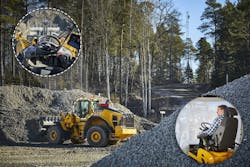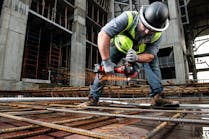Swedish telecom companies Telia and Ericsson are teaming with Volvo Construction Equipment (Volvo CE) to launch Sweden’s first 5G network for industrial use at Volvo CE’s facility in Eskilstuna, Sweden, as Volvo aims to become one of the first in the world to use 5G technology to test remote-controlled machines and autonomous solutions.
The 5G network will be used at Volvo CE’s research and development facility at Eskilstuna to further develop solutions for remote control of construction machinery and fully automated solutions.
It will also be used to increase understanding of how connected machines can create added value for the customer.
“Automation has several levels and having 5G is an important technical support to enable us to drive development in this area,” says Melker Jernberg, president of Volvo CE. “These trials in Eskilstuna will include the remote control of a conventional wheel loader but also further tests of the HX2 concept load carrier.”
The HX2 autonomous battery-electric load carrier has already undergone significant testing at a Skanska quarry in Gothenburg, Sweden.
“We can see that the industry’s interest in 5G is considerable,” says Anders Olsson, CEO of Telia Sweden. “Automation of the entire flow will mean new ways of working and greater gains from efficiency. But to connect business-critical machines and vehicles requires a solution that is able to handle the massive amounts of data with guaranteed connection. That is what 5G can give us.”
Even with fully automated systems, human intervention is still needed at times for control. Current remote-control technology has a time lag that makes it difficult to control at high speed or with high precision. 5G will make remote control simpler and safer, the telecom providers say.
“With extremely short response times, high capacity, and a high level of accessibility to the mobile network, commercial and standardized 5G technology can be used for applications such as remote control of heavy machinery in real time,” says Magnus Frodigh, head of research at Ericsson. “This opens up new opportunities for greater efficiency, cutting costs, and reducing risk in hazardous environments. 5G enables us to create a safer, more efficient, and sustainable society.”
Volvo CE expects to apply the lessons learned from tests at Eskilstuna to its global activities.
“We are testing locally in Eskilstuna, but we operate globally,” Jernberg says. “Connected machines and autonomous solutions are the future. They can give our customers more efficient production, logistics, greater flexibility, and safer work. By minimizing the potential safety risks and downtime associated with sectors such as mining, we can get closer to our goal of zero emissions, zero accidents, and zero unplanned stops.”





